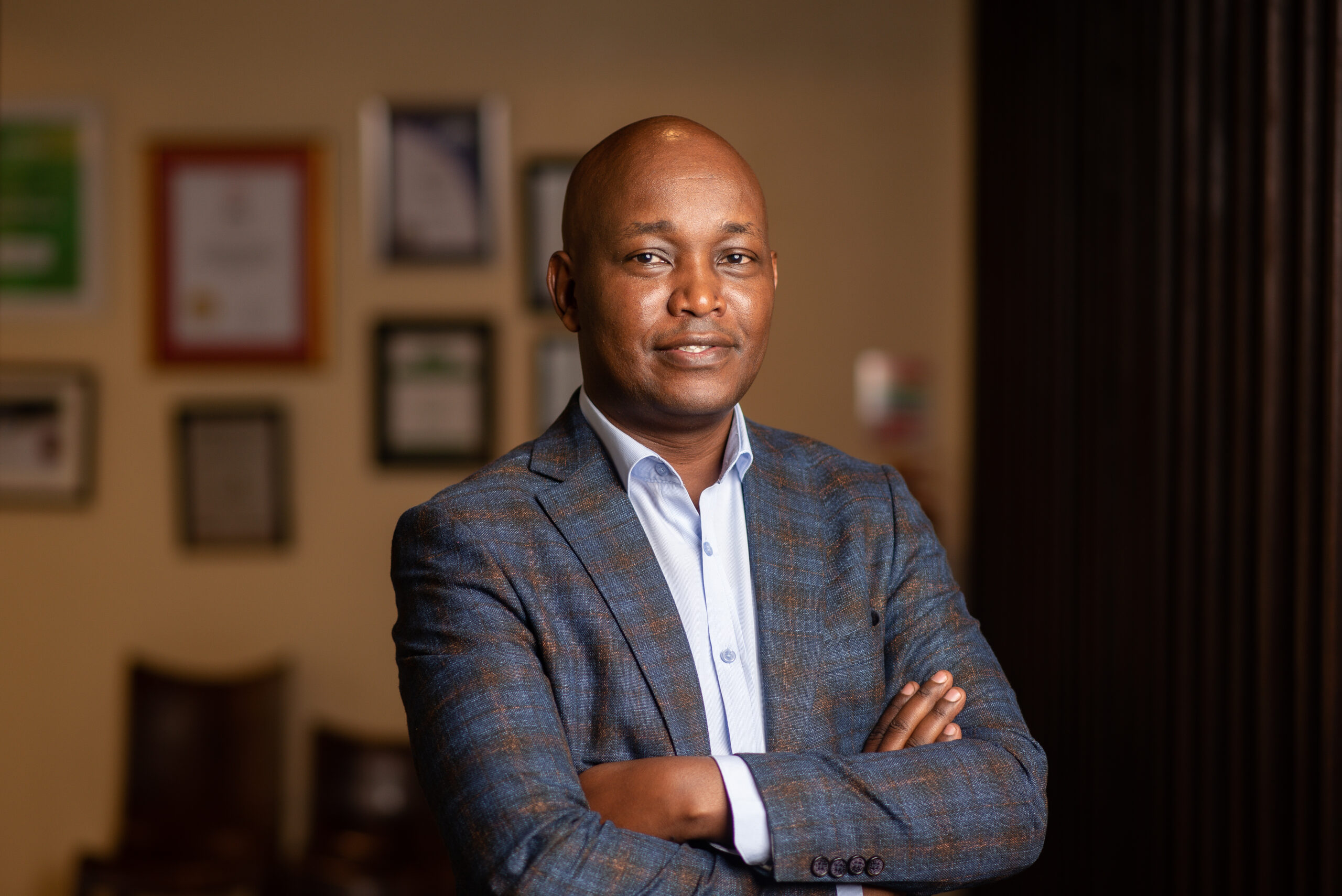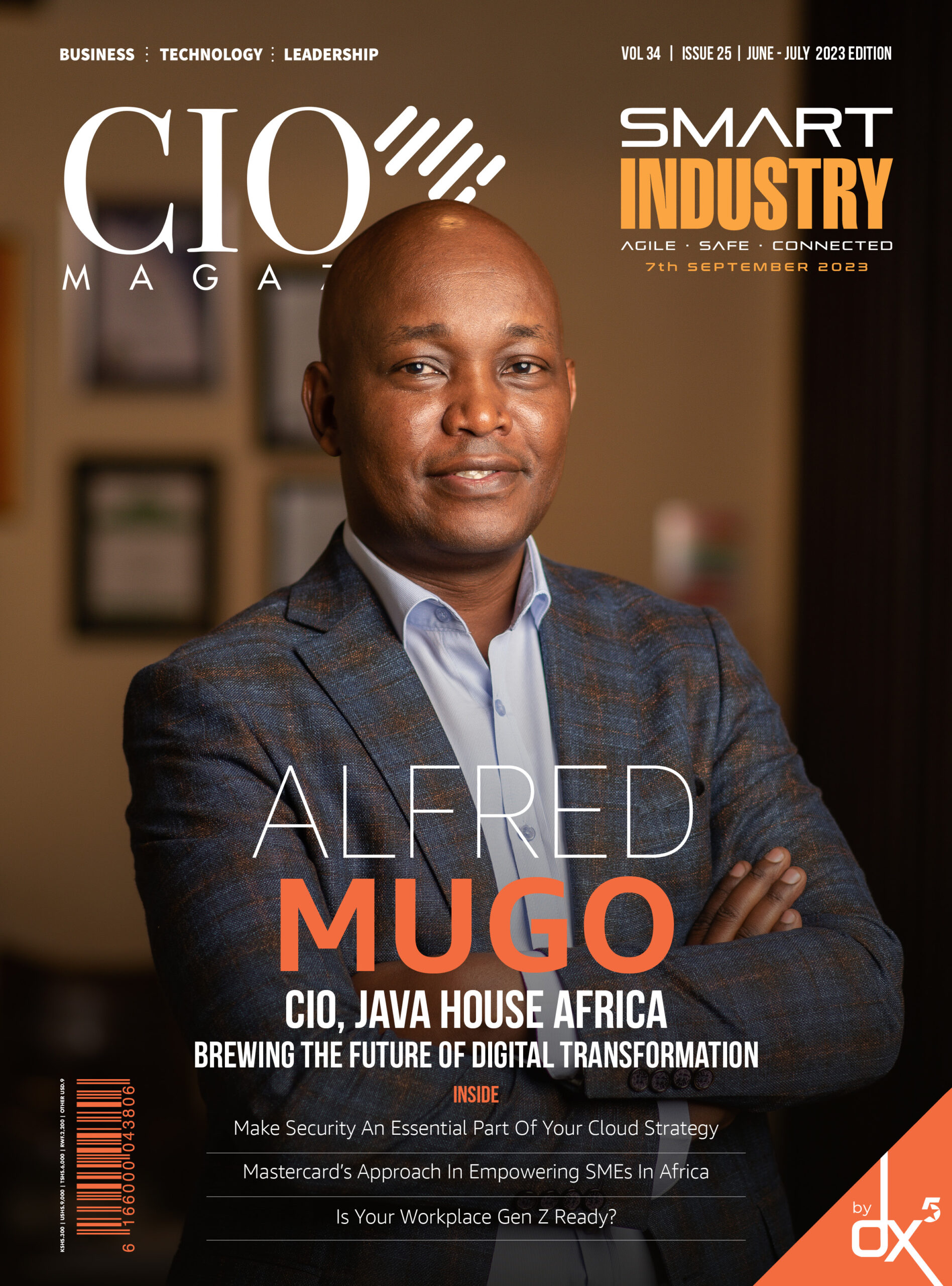advertisement
Meet Alfred Mugo Java House Africa’s CIO

If you stepped into one of the 70 captivating outlets of JAVA House Africa scattered across 14 vibrant cities in three countries of East Africa (Kenya, Uganda, and Rwanda), or any of its three sister brands, Planet Yoghurt, Khukito, and 360 Degrees Pizza, prepare to be enthralled by the remarkable blend of technology and dining experience. Your senses will be awestruck as you effortlessly scan the menu with your phone, or scroll their visually stunning digital menu boards that exude a sense of allure and sophistication. But there’s more to this technological marvel than meets the eye.
Behind the shimmering surface lies an intricate IT system, meticulously engineered to flawlessly manage the labyrinthine logistics and supply chain of the restaurant brands, ensuring a seamless operation that keeps track of ingredients and supplies in stock. Rest assured that your favourite dishes will never be disappointingly out of reach.
Beyond the indispensable cables and wires, Alfred Mugo, the distinguished CIO, undertakes the formidable task of empowering JAVA House to make informed business decisions. As I encountered him at the company head office at ABC Place, I immediately sensed that he is no ordinary IT professional preoccupied with mundane technicalities. Instead, he personifies a visionary who deeply comprehends the intricate tapestry of the business.
advertisement

With an impressive two decades of experience in the dynamic realm of IT, Alfred assumes the pivotal role of bridging the chasm between technology and business within the restaurant chain. Immersed in a profound understanding of the company’s unique requisites, he ardently seeks out IT solutions that seamlessly align with their ever-evolving needs. Alfred’s extraordinary finesse in articulation and his unwavering focus on driving business objectives facilitate an effortless persuasion process when engaging with other esteemed executives.
Even amidst the most turbulent season of the relentless COVID-19 pandemic, Alfred and his exceptional team have been showered with accolades, triumphantly claiming the prestigious Hospitality Sector Award at the illustrious CIO 100 Awards. Their unwavering dedication to delivering a customer-centric experience resonates deeply, leaving an indelible mark on the industry.
advertisement
Who is Alfred Mugo?
I describe myself as a consummate IT professional. I have been selling IT solutions for 15 years, including sales, presales, and delivery, which involves implementing and supporting projects. For the most part of my working life, I have been on the solutions sales side, where I sell to customers, understand their requirements, size up the project, design, and architect the solution, and implement it for them. In the last four years, I have transitioned to the customer side, where I evaluate solutions available in the market and deploy them to solve problems for our organisation. I have been in the IT industry for 20 years now, starting right after graduating from university. Even before graduation, I secured a job as an IT trainer, and I have been working in the technology field ever since.
You and your team have received accolades during the most intense season of COVID. What inspired you to prioritise the customer at the centre of the business?
advertisement
At Java, we always prioritise the customer. The customer is the king, and we exist to serve them. Everything we do must revolve around providing the customer with a positive experience. Apart from serving excellent food and coffee, which are among the best in Kenya and Africa, we also ensure that all our touchpoints are customer-centric. We constantly ask ourselves what we can do differently to interact better with customers, whether they are at the restaurant or elsewhere.
Could you provide more details about the new technology you have implemented at Java?
We call it the Vuka Project, which signifies a crossover from the old to the new. We have implemented a new ERP system, Microsoft Dynamics 365, for financial operations with supply chain management functions. We have transitioned from legacy systems, which consisted of separate finance, inventory, and human resource systems, to an integrated system with all modules. This allows us to run our business end-to-end, from product sourcing to inventory management, manufacturing, and distribution.
With over 70 branches in Kenya, as well as locations in Uganda and Rwanda, we conduct centralised processing and distribution daily to ensure fresh and consistent quality across all locations. The ERP system has greatly facilitated these operations. As a complex organisation with 2,100 employees, we have transformed our business using this ERP system. All departments can now collaborate using a single system, providing us with full visibility into our business and enabling certain efficiencies. This flagship project has been highly successful, and we are extremely pleased with the outcome.
Are you using any new technologies to serve customers better?
We have four tools that we use for data analysis. The ERP itself has a reporting and analytics module that reports and analyses business functions such as sales performance and customer behaviour. We have a tool called Atlas that directly connects to our ERP, which allows us to create templates or dashboards that are automatically updated from the system without much user intervention. For example, we can monitor sales per store every morning. The third one is a visualisation tool called DOMO, which allows us to pool data from multiple sources and visualise it. With a click of a button, you can see a dashboard with the various metrics you are looking for. With the insights we gain through DOMO, we can make quick business decisions.

How do you balance risk with keeping the lights on at Java, especially when transferring from one system to another?
It goes back to project planning. You make sure that the legacy system is still up and running. A good approach, especially when moving from a legacy system to a new one, is to have a transition period between the two so that you can continue working while the new one is being deployed, and then do a cutover at a specific time. So, you can have an overlap. When you are introducing a brand-new system, one of the key things is to ensure that you have the users very well trained. You should also conduct rigorous testing of the solution so that when you go live with it, you are 100 per cent sure that things will work. Importantly, build mitigation measures because something always fails or breaks.
As a CIO in a competitive industry, how do you stay updated on emerging trends, and what steps do you take to ensure that your team is at the forefront of innovation?
We read a lot. There is a wealth of research available online. We also attend industry events. We are always on the lookout for events. This could be a food expo at Sarit Center or a training session happening elsewhere. Additionally, we have industry experts coming to talk to us on a regular basis. Every month, we organise workshops on emerging technologies, especially in the food sector, from point of sale to ERP and data centres. Technology is changing rapidly, and staying informed is crucial to remain competitive.
What are some of your proudest accomplishments when it comes to your career?
We have made a significant difference in the way we operate. Today, we understand that we are in an industry that is changing post-COVID. We have implemented solutions that help the business stay ahead, become more efficient, reduce costs, and make life easier because everybody wants a simpler life. The interventions we have made are what keep me motivated.
JAVA Africa may need to purchase and implement a new IT system at some point. As the CIO, how would you convince other executives that the system is beneficial?
That’s a good question. We have already implemented an ERP system at Nairobi Java House. However, it’s important to note that Nairobi Java House operates in three countries: Kenya, Uganda, and Rwanda, with most of our operations based in Kenya. We run five brands, namely Java House, 360 Degree Pizza (in Kenya and Rwanda), Khukito, Planet Yoghurt, and Foodscape (our manufacturing and central warehousing business, which serves Java and other customers). My role is to sit within the business but work in IT. I prioritise understanding the business requirements first and then seek IT solutions that work for the business.
When it comes to convincing and gaining the support of other executives, it requires artful communication. You need to first understand the business, analyse the problem or business needs that require addressing, and then recommend a suitable solution. By the time I propose a suitable solution, the rest of the business already understands what we are looking for. This makes it easier to engage with and convince the other executives.
Would you say that you have learned from your failures? If so, which ones and what did you learn?
Failures are a part of life, and we learn a lot from them. When you fail, you learn how not to do something or how not to approach a problem. Failures can take various forms. Sometimes it comes in the form of not meeting a deadline because the project becomes more complicated than expected. At one point, we found that the adoption of the ERP was not high among the users, and it was not fully configured to produce certain types of reports. The management team had set a deadline of June last year to make the system work, or we would consider it a write-off. Unfortunately, due to the amount of work needed, we did not meet that deadline. However, in the following month, we were able to get the system working. Facing a deadline can be a lot of pressure, but we were able to overcome it, and we learned what caused the system not to work as expected.
What skills and experiences from your personal life do you draw on in your role as CIO, and how do they inform your decision-making?
I read a lot of non-fiction content online, which helps me develop habits of focus, and concentration, and gain broad knowledge in various areas outside of my work. This could be something medically related, or I might read about surfing or mechanics. This helps me recognise and understand other facets of the business in my role as a CIO that I wouldn’t ordinarily be exposed to. For instance, as an IT person, we don’t engage in manufacturing ourselves, but to support and provide solutions to the manufacturing team, I need to understand their business. Similarly, since we have a restaurant that runs on technology, I also need to understand that aspect. Essentially, I draw from my personal experiences of learning different things to better understand how my organization works and therefore provide solutions.
Outside work, I swim quite a lot. Swimming tones and exercises your entire body. It is also rigorous, and you find out that the kind of resilience, the kind of ability you need to achieve your swimming exercises is the same that is required at work. For example, when you have projects, they must come to completion in the required time.
If you could switch job roles at Java for a day, what would it be and why?
That’s a great question, and it’s something that I have thought about before. When I was employed here, my CEO told me that my first job was to go to the restaurant and learn the operations from the kitchen side, i.e., wash the dishes, cook some food, serve customers, and really understand the business. If I could switch roles today, I would not mind going and serving our customers because that’s where our business meets the consumer. I would be a waitstaff.
Tell us about your experience serving as a waiter during your first days at Java and the lessons you learned.
I served as a waiter for three days. You learn about the speed of service, the different demands of customers, and the importance of customer satisfaction. Customers are always right. You also learn about the environment on the ground. It is actually very hard to stay on your feet for eight hours and serve everybody with a smile and so on. Again, it shows the dedication, resilience, and the kind of work ethic that is required to deliver on that job. It is an exciting experience because you get to meet lots of people and have different experiences.
Interesting experience there. If you had to eat one meal from Java every day for a month, what would it be and why?
I would choose our steak and eggs, which are also served with a side of vegetables and starch. I like steak and eggs because it has flavour and is full of protein, which sustains you throughout the day. I would add a single latte to the mix.
You mentioned that you read a lot of non-fiction. Do you also watch movies?
I watch movies when I have time. However, my two lovely kids are always on the TV, so I don’t get to see much of Netflix.
Now that you have mentioned your kids, do you guide them towards a particular career, or do you let them pursue their own passions?
I would like them to follow their own passions. My daughter is an artsy person, and I cannot tell whether it’s because of her nature or if the Competency Based Curriculum (CBC) is bringing this out. She is interested in music and drawing. She is always drawing something or the other, so I have enrolled her in an art school. My son, on the other hand, is passionate about football and sciences, leaning towards IT. He has a keen interest in computer gaming. I have challenged him not just to play games but to develop African computer games. I have encouraged him to create games inspired by tribal chiefs such as Lwanda Magere and Koitalel arap Samoei.
Still on your family, as a CIO, are you constantly on call? How does this interfere with your private life?
When you have tough projects, you will have to spend a lot of time on them. However, over time, I have learned to maintain a work-life balance. I have grown and enabled my team, and they are capable of handling work-related issues, so I don’t have to be involved all the time, especially during non-office hours. Actually, the more phone calls you receive when you are at home, the more it shows there is a problem with your team. It indicates that someone else is not capable of taking up that role. Escalations are definitely there, but they are the last resort.
This article was first published in the June 2023 edition of CIO Africa magazine.